Part 4—“A Box of Jewels” - 1932 – 1934
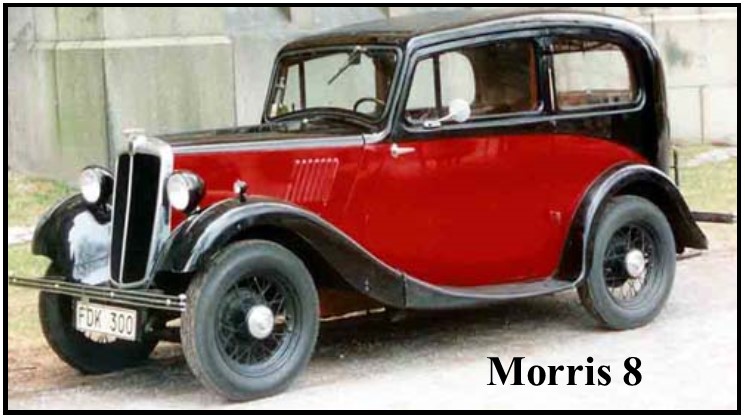
In the
early Thirties, the sale of Sevens started to fall away, albeit still
one the greatest selling cars in the market place. Other
manufacturers were bringing out new models (Ford 8 (£135) and the Model
Y (later the Popular) – the first British 4-seater saloon to sell for £100; Morris 8 (£142), Hillman Minx (£157). There was also a growing demand for slightly bigger cars in the 10HP class.
Away from saloons, Austin introduced the new AJ open 4-seat Tourer, the Type 65 Sports (£140) and the Sports 75 (£170).
But in 1934, Herbert Austin had to acknowledge the need for a radical change in design “Whist I appreciate the advances these new models represent, it is not without a tinge of regret that I see the passing of our familiar radiator shell which has been associated with the name of Austin since the founding of the firm”. And so swept-in the cowled and aerodynamic Ruby (£120 - £7,000 today), Pearl (£128 - £7,500) and Opal (£100 - £5,900). The public’s response was immediate and Austins produced 20% more cars than ever, helped by the first £100 Austin – the 2-seater Opal (which, ironically retained the flat chrome rad for a little while longer).
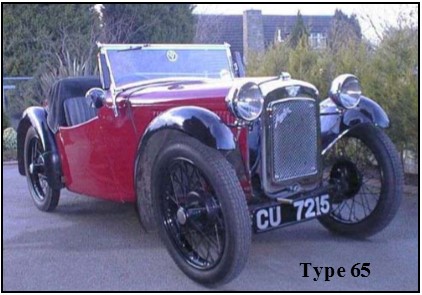 AT THAT TIME . . . . . .
AT THAT TIME . . . . . .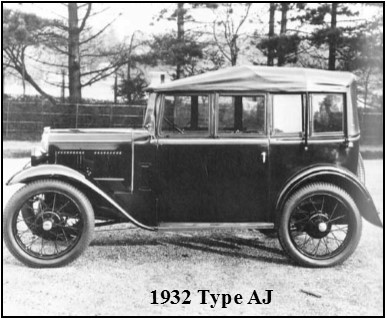
The Great Depression was biting hard - millions were forced to use soup kitchens as a way of life; due to lack of benefits many were forced to search old coal slag heaps hoping to find coal to use for heating; import tariffs were introduced at a rate of 10% on all imports except those from the countries of the British Empire; public sector wages and unemployment was cut by 10%, and income tax was raised from 22.5% to 25%. The largest National Hunger March during the great depression marched from Jarrow to London in September/October and was met by 70,000 police, including mounted police, using force to disperse the demonstrators.
The worst effects of the great depression happened in the North including Yorkshire and Nottinghamshire, Tyneside, Sheffield, Lancashire and Glasgow where 30% of the workforce were unemployed; 200,000 unemployed men were sent to the work camps, which continued in operation until 1939. 1933 was the one of the worst years during the great depression and very few countries around the world were not affected but in Britain growth in modern manufacture of electrical goods and a boom in the motor car industry was helped by a growing southern population and an expanding middle class where some people become more affluent during the Depression since prices fell, which meant more money for luxuries. Hire-purchase allowed people to get luxuries 'on the never-never' , there were improvements at work such as reduction in working hours and holidays with pay. Three million new houses were built in the 1930s, there was a huge increase in car ownership, vacuum cleaners and washing machines, radios and the first TVs.
1932 The 1932 Summer Olympics was celebrated in 1932 in Los Angeles. No other cities made a bid to host these Olympics being held during the worldwide Great Depression with many nations and athletes unable to pay for the trip to Los Angeles. Fewer than half the participants of the 1928 Summer Olympics in Amsterdam returned to compete in 1932. In true American style, an Olympic Village was built for the first time (only for male athletes - female athletes were housed at a local hotel);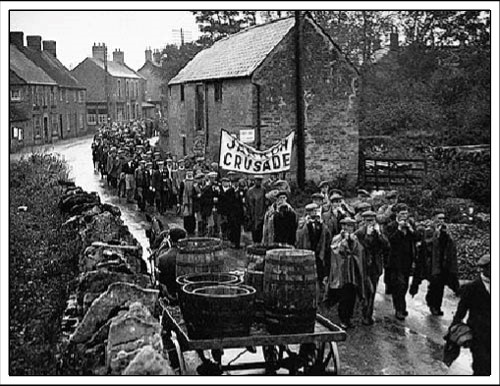 there was the first use of a victory podium; and American
Football was introduced as a demonstration event. Percy Williams from
Canada won the men’s 100m at 10.3 secs (currently 9.58secs) with
Britain’s Harold Abrahams coming 3rd. Eamon de Valera was elected
President of Ireland; Nazi Party gained majority in German Reichstag;
Aldous Huxley wrote “Brave New World”; BBC was formed to take over
broadcasting from the Baird Corporation; Shakespeare Theatre opened in
Stratford Upon Avon and Broadcasting House opened in West London; films
included “A Farewell To Arms” with Gary Cooper, “Grand Hotel” with
Garbo and “Shanghai Express” with Marlene Dietrich; Johnny Weissmuller
appeared in the first Tarzan film and Shirley Temple’s first film was “Red-haired Alibi”; popular
songs included: Bing Crosby’s “Brother Can You Share A Dime?”, “I’m
Getting Sentimental Over You”, “Night & day” and “April In Paris”;
the Nobel Prize for Physics went to Heisenberg for his theories on
Quantum
Mechanics; Amelia Earhart flew solo across the Atlantic; unemployed in
Britain sored to 2.8 million (25%); average house price was £540
(£30,700)
there was the first use of a victory podium; and American
Football was introduced as a demonstration event. Percy Williams from
Canada won the men’s 100m at 10.3 secs (currently 9.58secs) with
Britain’s Harold Abrahams coming 3rd. Eamon de Valera was elected
President of Ireland; Nazi Party gained majority in German Reichstag;
Aldous Huxley wrote “Brave New World”; BBC was formed to take over
broadcasting from the Baird Corporation; Shakespeare Theatre opened in
Stratford Upon Avon and Broadcasting House opened in West London; films
included “A Farewell To Arms” with Gary Cooper, “Grand Hotel” with
Garbo and “Shanghai Express” with Marlene Dietrich; Johnny Weissmuller
appeared in the first Tarzan film and Shirley Temple’s first film was “Red-haired Alibi”; popular
songs included: Bing Crosby’s “Brother Can You Share A Dime?”, “I’m
Getting Sentimental Over You”, “Night & day” and “April In Paris”;
the Nobel Prize for Physics went to Heisenberg for his theories on
Quantum
Mechanics; Amelia Earhart flew solo across the Atlantic; unemployed in
Britain sored to 2.8 million (25%); average house price was £540
(£30,700)
1933 The cost of bread ca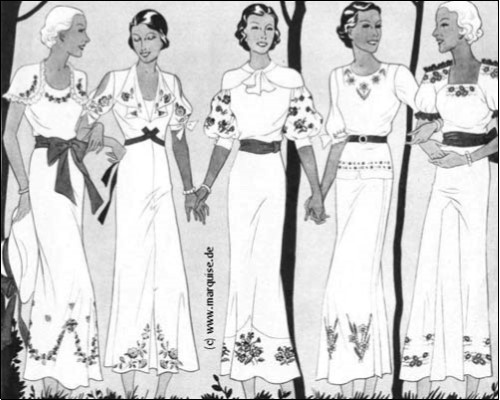
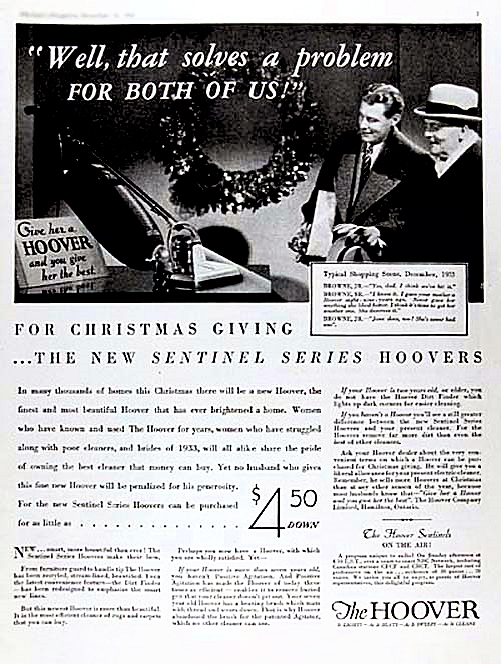 me down slightly to 8d (£1.90 today) as did petrol to
17½d per gallon (91p/litre); Adolf Hitler was appointed German
Chancellor with Goering as Prussian Prime Minister and Goebbels as
Minister of Propaganda; first concentration camps built in Germany;
country-wide book burning across Germany; in an early election, Nazi
Party achieved a 92% vote; Adolf Hitler declared his intentions for a
state-sponsored "People’s Car"; British Prime Minister Neville
Chamberlain returned from Germany and announces to the world "Peace In
Our Time"; FD Roosevelt elected President of the USA; films
included: Garbo in “Queen Christina”, “Dinner At Eight”, “King Kong”,
“Dr Jekyll & Mr Hyde” and Noel Coward’s “Cavalcade”; Sir Malcolm
Campbell achieved World Land Speed Record of 272.46 mph in Bluebird;
Henry Royce died; statistics from Spitsbergen showed Arctic warming;
Sir Norman Angell (UK) awarded the Nobel Peace Prize for his warnings
on the growing tension in Europe: “You cannot kill ideas with bullets”;
George Orwell wrote “Down & Out In Paris & London” and HG Wells
wrote “The Shape Of Things To Come”; films included: “Little Women”
with Katharine Hepburn and “She Done Him Wrong” with Mae West; popular
songs included: “Smoke Gets In Your Eyes”, “Stormy Weather” and “Easter Parade”.
me down slightly to 8d (£1.90 today) as did petrol to
17½d per gallon (91p/litre); Adolf Hitler was appointed German
Chancellor with Goering as Prussian Prime Minister and Goebbels as
Minister of Propaganda; first concentration camps built in Germany;
country-wide book burning across Germany; in an early election, Nazi
Party achieved a 92% vote; Adolf Hitler declared his intentions for a
state-sponsored "People’s Car"; British Prime Minister Neville
Chamberlain returned from Germany and announces to the world "Peace In
Our Time"; FD Roosevelt elected President of the USA; films
included: Garbo in “Queen Christina”, “Dinner At Eight”, “King Kong”,
“Dr Jekyll & Mr Hyde” and Noel Coward’s “Cavalcade”; Sir Malcolm
Campbell achieved World Land Speed Record of 272.46 mph in Bluebird;
Henry Royce died; statistics from Spitsbergen showed Arctic warming;
Sir Norman Angell (UK) awarded the Nobel Peace Prize for his warnings
on the growing tension in Europe: “You cannot kill ideas with bullets”;
George Orwell wrote “Down & Out In Paris & London” and HG Wells
wrote “The Shape Of Things To Come”; films included: “Little Women”
with Katharine Hepburn and “She Done Him Wrong” with Mae West; popular
songs included: “Smoke Gets In Your Eyes”, “Stormy Weather” and “Easter Parade”.
1934 The tax on petrol went up to a record 47.05% (60% today!); the dollar exchange rate shot to an all-time record high of $5.20 ($1.55 today); driving test were introduced in Britain; Oswald Mosley addressed mass meetings in Britain; Hitler met Mussolini; Hitler appointed Führer; Winston Churchill made his first speech against Nazi-ism; “Goodbye Mr Chips” best seller; films included: “The Thin Man”, “Of Human Bondage”, “It happened One Night” and Donald Duck appeared for the first time in "The Wise Little Hen”; Shirley Temple sang “The Good Ship Lollipop” in the film “Bright Eyes”; popular songs included: “Blue Moon”, “The Continental” and “All Through The Night”; the average house price dropped to £510 (£29,750); the Queen Mary was launched in Scotland
David Whetton
Away from saloons, Austin introduced the new AJ open 4-seat Tourer, the Type 65 Sports (£140) and the Sports 75 (£170).
But in 1934, Herbert Austin had to acknowledge the need for a radical change in design “Whist I appreciate the advances these new models represent, it is not without a tinge of regret that I see the passing of our familiar radiator shell which has been associated with the name of Austin since the founding of the firm”. And so swept-in the cowled and aerodynamic Ruby (£120 - £7,000 today), Pearl (£128 - £7,500) and Opal (£100 - £5,900). The public’s response was immediate and Austins produced 20% more cars than ever, helped by the first £100 Austin – the 2-seater Opal (which, ironically retained the flat chrome rad for a little while longer).
 AT THAT TIME . . . . . .
AT THAT TIME . . . . . .
The Great Depression was biting hard - millions were forced to use soup kitchens as a way of life; due to lack of benefits many were forced to search old coal slag heaps hoping to find coal to use for heating; import tariffs were introduced at a rate of 10% on all imports except those from the countries of the British Empire; public sector wages and unemployment was cut by 10%, and income tax was raised from 22.5% to 25%. The largest National Hunger March during the great depression marched from Jarrow to London in September/October and was met by 70,000 police, including mounted police, using force to disperse the demonstrators.
The worst effects of the great depression happened in the North including Yorkshire and Nottinghamshire, Tyneside, Sheffield, Lancashire and Glasgow where 30% of the workforce were unemployed; 200,000 unemployed men were sent to the work camps, which continued in operation until 1939. 1933 was the one of the worst years during the great depression and very few countries around the world were not affected but in Britain growth in modern manufacture of electrical goods and a boom in the motor car industry was helped by a growing southern population and an expanding middle class where some people become more affluent during the Depression since prices fell, which meant more money for luxuries. Hire-purchase allowed people to get luxuries 'on the never-never' , there were improvements at work such as reduction in working hours and holidays with pay. Three million new houses were built in the 1930s, there was a huge increase in car ownership, vacuum cleaners and washing machines, radios and the first TVs.
1932 The 1932 Summer Olympics was celebrated in 1932 in Los Angeles. No other cities made a bid to host these Olympics being held during the worldwide Great Depression with many nations and athletes unable to pay for the trip to Los Angeles. Fewer than half the participants of the 1928 Summer Olympics in Amsterdam returned to compete in 1932. In true American style, an Olympic Village was built for the first time (only for male athletes - female athletes were housed at a local hotel);
 there was the first use of a victory podium; and American
Football was introduced as a demonstration event. Percy Williams from
Canada won the men’s 100m at 10.3 secs (currently 9.58secs) with
Britain’s Harold Abrahams coming 3rd. Eamon de Valera was elected
President of Ireland; Nazi Party gained majority in German Reichstag;
Aldous Huxley wrote “Brave New World”; BBC was formed to take over
broadcasting from the Baird Corporation; Shakespeare Theatre opened in
Stratford Upon Avon and Broadcasting House opened in West London; films
included “A Farewell To Arms” with Gary Cooper, “Grand Hotel” with
Garbo and “Shanghai Express” with Marlene Dietrich; Johnny Weissmuller
appeared in the first Tarzan film and Shirley Temple’s first film was “Red-haired Alibi”; popular
songs included: Bing Crosby’s “Brother Can You Share A Dime?”, “I’m
Getting Sentimental Over You”, “Night & day” and “April In Paris”;
the Nobel Prize for Physics went to Heisenberg for his theories on
Quantum
Mechanics; Amelia Earhart flew solo across the Atlantic; unemployed in
Britain sored to 2.8 million (25%); average house price was £540
(£30,700)
there was the first use of a victory podium; and American
Football was introduced as a demonstration event. Percy Williams from
Canada won the men’s 100m at 10.3 secs (currently 9.58secs) with
Britain’s Harold Abrahams coming 3rd. Eamon de Valera was elected
President of Ireland; Nazi Party gained majority in German Reichstag;
Aldous Huxley wrote “Brave New World”; BBC was formed to take over
broadcasting from the Baird Corporation; Shakespeare Theatre opened in
Stratford Upon Avon and Broadcasting House opened in West London; films
included “A Farewell To Arms” with Gary Cooper, “Grand Hotel” with
Garbo and “Shanghai Express” with Marlene Dietrich; Johnny Weissmuller
appeared in the first Tarzan film and Shirley Temple’s first film was “Red-haired Alibi”; popular
songs included: Bing Crosby’s “Brother Can You Share A Dime?”, “I’m
Getting Sentimental Over You”, “Night & day” and “April In Paris”;
the Nobel Prize for Physics went to Heisenberg for his theories on
Quantum
Mechanics; Amelia Earhart flew solo across the Atlantic; unemployed in
Britain sored to 2.8 million (25%); average house price was £540
(£30,700)1933 The cost of bread ca

 me down slightly to 8d (£1.90 today) as did petrol to
17½d per gallon (91p/litre); Adolf Hitler was appointed German
Chancellor with Goering as Prussian Prime Minister and Goebbels as
Minister of Propaganda; first concentration camps built in Germany;
country-wide book burning across Germany; in an early election, Nazi
Party achieved a 92% vote; Adolf Hitler declared his intentions for a
state-sponsored "People’s Car"; British Prime Minister Neville
Chamberlain returned from Germany and announces to the world "Peace In
Our Time"; FD Roosevelt elected President of the USA; films
included: Garbo in “Queen Christina”, “Dinner At Eight”, “King Kong”,
“Dr Jekyll & Mr Hyde” and Noel Coward’s “Cavalcade”; Sir Malcolm
Campbell achieved World Land Speed Record of 272.46 mph in Bluebird;
Henry Royce died; statistics from Spitsbergen showed Arctic warming;
Sir Norman Angell (UK) awarded the Nobel Peace Prize for his warnings
on the growing tension in Europe: “You cannot kill ideas with bullets”;
George Orwell wrote “Down & Out In Paris & London” and HG Wells
wrote “The Shape Of Things To Come”; films included: “Little Women”
with Katharine Hepburn and “She Done Him Wrong” with Mae West; popular
songs included: “Smoke Gets In Your Eyes”, “Stormy Weather” and “Easter Parade”.
me down slightly to 8d (£1.90 today) as did petrol to
17½d per gallon (91p/litre); Adolf Hitler was appointed German
Chancellor with Goering as Prussian Prime Minister and Goebbels as
Minister of Propaganda; first concentration camps built in Germany;
country-wide book burning across Germany; in an early election, Nazi
Party achieved a 92% vote; Adolf Hitler declared his intentions for a
state-sponsored "People’s Car"; British Prime Minister Neville
Chamberlain returned from Germany and announces to the world "Peace In
Our Time"; FD Roosevelt elected President of the USA; films
included: Garbo in “Queen Christina”, “Dinner At Eight”, “King Kong”,
“Dr Jekyll & Mr Hyde” and Noel Coward’s “Cavalcade”; Sir Malcolm
Campbell achieved World Land Speed Record of 272.46 mph in Bluebird;
Henry Royce died; statistics from Spitsbergen showed Arctic warming;
Sir Norman Angell (UK) awarded the Nobel Peace Prize for his warnings
on the growing tension in Europe: “You cannot kill ideas with bullets”;
George Orwell wrote “Down & Out In Paris & London” and HG Wells
wrote “The Shape Of Things To Come”; films included: “Little Women”
with Katharine Hepburn and “She Done Him Wrong” with Mae West; popular
songs included: “Smoke Gets In Your Eyes”, “Stormy Weather” and “Easter Parade”.1934 The tax on petrol went up to a record 47.05% (60% today!); the dollar exchange rate shot to an all-time record high of $5.20 ($1.55 today); driving test were introduced in Britain; Oswald Mosley addressed mass meetings in Britain; Hitler met Mussolini; Hitler appointed Führer; Winston Churchill made his first speech against Nazi-ism; “Goodbye Mr Chips” best seller; films included: “The Thin Man”, “Of Human Bondage”, “It happened One Night” and Donald Duck appeared for the first time in "The Wise Little Hen”; Shirley Temple sang “The Good Ship Lollipop” in the film “Bright Eyes”; popular songs included: “Blue Moon”, “The Continental” and “All Through The Night”; the average house price dropped to £510 (£29,750); the Queen Mary was launched in Scotland
David Whetton